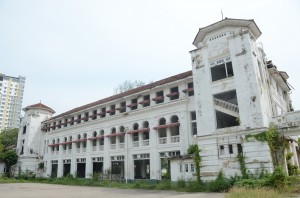
Story by Caleb Yeoh
Pix by Mark James
THE state government and the Penang Island Municipal Council (MPPP) have issued a notice urging the owners of an abandoned colonial heritage building to take immediate action to restore and conserve the structure.
Located at No. 40 Jalan Sultan Ahmad Shah, the structure owned by Runnymede Hotels Sdn Bhd was left, abandoned and broken for a long period of time.
“This order is part of a plan to repair a cluster of buildings along Jalan Sultan Ahmad Shah, which have fallen into disrepair. The building and its land is listed under the ownership of Runnymede and was listed as a ‘Category 2’ heritage premise by MPPP,” exco for Local Government, Traffic Management and Flood Mitigation Chow Kon Yeow said at a recent press conference.
Chow added that this was in line with the state’s guidelines which require land owners to initiate preservation and conservation works on classified heritage buildings.
Under the available city council laws, any abandoned buildings in deplorable conditions and safety conditions, MPPP may issue notices under Section 82 of the Local Government Act and Section 83 of the Street, Drainage and Bulding Act 1974 among which the owner must fix a safety gate, restore structural damage, prevent break ins, remove wild weeds, bushes and trees and remove all foreign objects that may pose a safety hazard.
Should the notice be ignored, MPPP will proceed to carry out temporary protection and restoration works and could escalate the issue bringing the owners to court.
The building at no 40 Jalan Sultan Ahmad Shah was built around 1921 and served as an estate, a British Marine outpost, a Japanese occupation building and even as a Malaysian army camp after independence.
The plot of land also originally housed Sir Stamford Raffles when he and his family resided in Penang in the 1800s before leaving for Singapore.
